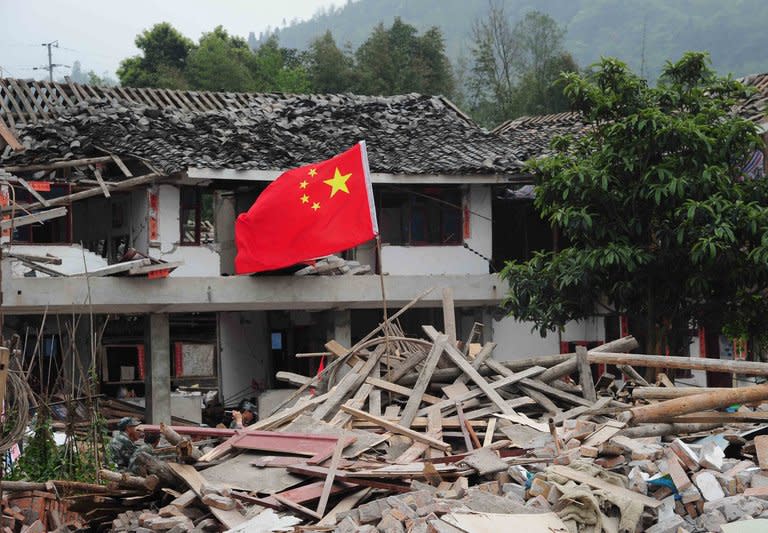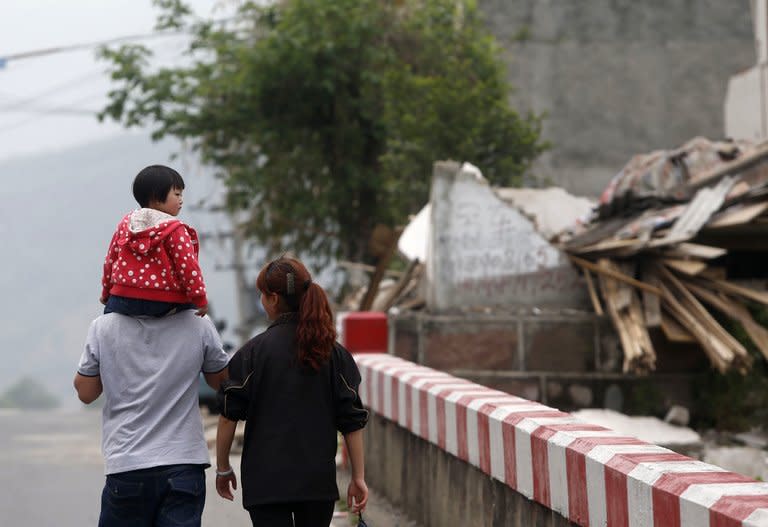China quake takes an only son, and all hope
Wu Yong sobs as fellow villagers carry away his teenage boy's coffin, after a terrifying tremor in the mountains of southwest China robbed him of the only son he is likely ever to have. "I saw my son but I couldn't save him," the 42-year-old said, recalling the moment he rushed from the living room to his boy's bedroom to discover him buried under rubble. "I called him and he answered two times... but I couldn't save him," Wu added, his house totally caved in, as friends tried to comfort him. His 38-year-old wife Yue Yingcui collapsed in the street moments earlier, screaming in grief as neighbours and friends struggled to hold her in their arms. She had just seen villagers remove a live rooster -- believed to help the spirit find its home and ward off evil -- from her son's coffin before it was taken up the street to the crackle of Chinese fireworks. The scene was played out in front of 100 or so villagers, as the smell of powder from the firecrackers filled the grim air of suffering that has descended on Longmen, a tiny rural community in southwestern Sichuan province. The life of many in Longmen, and across the wider county of Lushan, changed forever when the devastating earthquake struck on Saturday morning, leaving more than 200 people dead or missing. But the loss of 15-year-old Wu Ji, a cherished child in a society that prizes sons far more than daughters, represented a traumatic body-blow for the family of farm workers. In China, rural families are exempt from the country's one-child policy as parents often rely on support from children in their later years, unlike urban residents, and much of that is provided by sons. But Wu Ji, who had a sister, was the only son in this close-knit family and his parents, although not old, consider him irreplaceable. The wider family, which includes grandparents and the deceased boy's uncle, say they have no hope for the future. For now, the distraught father is thinking only of the tragic present. "From today onwards I do not have a son," Wu said, stroking his brow and looking towards the floor. "He had so many friends. He had such a humorous and gentle personality." As the funeral procession made its way up the kind of steep and narrow mountain street that gives quake-prone Sichuan its rugged character, nearby residents struggled to come to terms with the devastation. An 88-year-old woman surnamed Zhu walked down the rubble-littered Chonglu Road with a two-year-old infant on her back, discussing with neighbours their common ordeal. "I will stay outside with this child until I am certain that there are no more earthquakes," she said, breaking off from a conversation with a family making noodles on a makeshift stove on the curbside. With many houses precariously tilted or partially collapsed, locals are staying outside to eat, watch television and sleep. The area was previously populated with two- or three-story houses. Although simple and basic inside, they lend a certain grandeur to what is actually one of China's poorest regions. But in one small community that previously consisted of six or seven properties, there lay only rubble, pierced with a flag pole adorned with the red and gold Chinese flag. Standing behind the rubble, residents sat on stones discussing the damage. "Three people died in that building, and no one wants to live in this area any more because it is too dangerous," a 45-year-old man, surnamed Yang, told AFP. Another neighbour, speaking quietly under his breath, muttered: "Where else can we go?"



